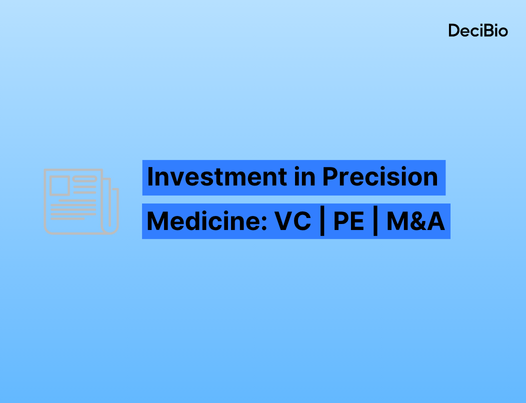Highlights & Summary
October has been an eventful month! The biggest news probably comes from the Nobel prize announcements which highlight AI’s growing influence in drug discovery, with one half of the Chemistry prize going to David Baker “for computational protein design” and the other half jointly to Demis Hassabis and John M. Jumper “for protein structure prediction” (i.e. AlphaFold). Beyond the Nobel excitement, there were plenty of updates across the field, from new partnerships—like Eli Lilly teaming up with insitro—to significant funding rounds for companies like Suki and Pathos AI.
Happy reading!
AI in Drug Discovery
1 | Recursion Receives FDA Clearance for First-in-Class Cancer Drug Targeting RBM39 | Clinical Trial
2 | BenevolentAI CEO Steps Down as Company Struggles to Meet AI Drug Development Goals | Personnel
3 | Eli Lilly and insitro Collaborate to Develop AI-Driven siRNA Therapies for Metabolic Diseases | Partnerships
4 | Archon Biosciences Secures $20M to Advance AI-Designed Antibody Cages for Challenging Disease Targets | Company Creation
5 | Pathos AI Raises $62M in Series C Funding to Advance AI-Driven Oncology Therapies | Financing
AI in Diagnostics
1 | Echo IQ Secures 510(k) Approval for an AI-Driven Heart Disease Diagnostic Tool | Regulatory
2 | Google Partners with Healthcare Providers in India and Thailand to Operationalize AI-Tool for Diabetic Retinopathy Detection | Partnership
3 | The Chinese University of Hong Kong Pioneers Use of an AI-Powered Endoscopy Tool | Product Launch
4 |Springbok Analytics Receives 510(k) Approval for MuscleView Tool | Regulatory
AI in Healthcare
1 | Suki secures $70M Series D funding and expands partnership with MedStar Health | Funding & Partnership
2 | The AI Centre for Value Based Healthcare partners with deepc to accelerate and transform NHS adoption of radiology AI | Partnership
3 | Microsoft expands AI healthcare capabilities | Product Launch
4 | Cleveland Clinic and Amazon One Medical partner to expand coordinated care access | Partnership
5 |Oracle unveils next-generation EHR with AI integrations| Product Launch
AI in Drug Discovery
1 | Recursion Receives FDA Clearance for First-in-Class Cancer Drug Targeting RBM39 | Clinical Trial
Recursion announced FDA clearance for an investigational new drug application for REC-1245, a novel RBM39 degrader aimed at treating biomarker-enriched solid tumors and lymphoma. This drug, developed using Recursion's AI-driven platform, targets RBM39 without affecting related proteins CDK12 or CDK13, progressing from concept to preclinical stage in under 18 months. The Phase 1/2 trial, set to begin dosing in late 2024, will assess REC-1245's safety, tolerability, and effectiveness in solid tumor and lymphoma patients, potentially addressing unmet treatment needs.
2 | BenevolentAI CEO Steps Down as Company Struggles to Meet AI Drug Development Goals | Personnel
BenevolentAI’s CEO Joerg Moeller has stepped down after less than 10 months, amid ongoing struggles for the AI-focused biotech. Since going public in 2022, BenevolentAI's stock has dropped over 90%, and its lead drug candidate failed in a mid-stage eczema study, leading to the program's discontinuation. Founder Ken Mulvany, now executive chairman, emphasized the platform’s “incredible potential” despite setbacks. BenevolentAI has faced significant challenges, including layoffs and cutbacks, and its clinical pipeline has not met initial growth projections. Similar challenges have impacted other AI-driven biotechs, with key peers facing leadership changes and financial difficulties.
3 | Eli Lilly and insitro Collaborate to Develop AI-Driven siRNA Therapies for Metabolic Diseases | Partnerships
Eli Lilly and insitro have entered into three strategic agreements to develop treatments for metabolic diseases, including metabolic dysfunction-associated steatotic liver disease (MASLD). Insitro will utilize Lilly's GalNAc delivery technology with two of its small interfering RNA (siRNA) molecules targeting liver functions. Additionally, the companies will collaborate on developing an antibody for a novel metabolic disease target, with insitro leading post-candidate nomination development and commercialization. This partnership combines insitro's AI-driven target discovery platform with Lilly's expertise in drug delivery and metabolic disease biology
4 | Archon Biosciences Secures $20M to Advance AI-Designed Antibody Cages for Challenging Disease Targets | Company Creation
Archon Biosciences has emerged from stealth mode, announcing $20 million in seed funding led by Madrona Ventures. The company is developing Antibody Cages (AbCs), a novel class of biologics combining antibodies with AI-generated protein structures to target previously undruggable disease mechanisms. This technology stems from research at the University of Washington's Institute for Protein Design, co-founded by Nobel laureate Dr. David Baker. AbCs offer precise control over structure, enhancing specificity and potency in therapeutic applications.
5 | Pathos AI Raises $62M in Series C Funding to Advance AI-Driven Oncology Therapies | Financing
Pathos AI, a Chicago-based clinical-stage biotechnology company, has secured $62 million in an oversubscribed Series C funding round led by New Enterprise Associates, with participation from Revolution Growth and existing investors Lightbank and Builders VC. This investment increases the company's total funding to $102 million and its valuation to $600 million. The funds will be used to expand Pathos AI's team, advance its AI-driven drug development platform, and progress its clinical-stage pipeline of precision oncology therapeutics. Over the past year, Pathos AI has acquired two clinical-stage precision oncology assets, P-300 and P-500, with plans to initiate clinical trials in 2025. The company's proprietary PathOS™ platform utilizes artificial intelligence to enhance patient selection strategies and clinical trial design, aiming to improve the success rates of investigational drugs.
AI in Diagnostics
1 | Echo IQ Secures 510(k) Approval for an AI-Driven Heart Disease Diagnostic Tool | Regulatory
Echo IQ, an Australian company using AI to enhance structural heart disease diagnoses, obtained 510(k) regulatory approval in the US for its EchoSolv AS product. The EchoSolv software uses AI to automate aortic stenosis identification in high-risk patients, with up to 97% accuracy. FDA clearance follows a recent $4.7 million fundraising round, which will enable the company to continue developing more AI-driven heart disease diagnostic solutions. Echo IQ will focus on US-based sales efforts while considering partnerships with US-based hospitals, as well as device manufacturers / pharmaceutical companies to potentially license the technology.
2 | Google Partners with Healthcare Providers in India and Thailand to Operationalize AI-Tool for Diabetic Retinopathy Detection | Partnership
Google has partnered with Forus Health, AuroLab, and Perceptra to distribute its AI-enabled diabetic retinopathy model in Thailand and India. Diabetic retinopathy is a leading cause of preventable blindness, especially in regions where diabetic patients lack access to eye specialists. For nearly a decade, Google has been working to construct an AI model that may aid physicians in diabetic retinopathy detection, ultimately supporting earlier treatment. Collaborating with healthcare providers may help secure local regulatory approval and disseminate the model in clinical systems across Thailand and India.
3 | The Chinese University of Hong Kong Pioneers Use of an AI-Powered Endoscopy Tool | Product Launch
The Chinese University of Hong Kong (CUHK) pioneers testing of an AI-powered upper gastrointestinal endoscopy system by Japan-based medical endoscope manufacturer, Olympus. The system is designed to detect gastric cancer, and the CUHK team believes the new technology will enable accurate early detection of tumors without high color contrast, in addition to reducing the number of cancers that are missed in endoscopies, and reducing endoscopist fatigue. Olympus previously developed a similar AI system for adenoma detection via colonoscopy.
4 | Springbok Analytics Receives 510(k) Approval for MuscleView Tool | Regulatory
Springbok Analytics has received FDA 510(k) clearance for MuscleView, an AI-powered tool that analyzes MRI data to construct 3D visualizations of musculature for sports medicine, orthopedic, and therapeutic applications. Key outputs from the technology are muscle volume, left-right muscle asymmetry, bone volume, and intramuscular fat percentage, all of which can be used to advance understanding of muscles and muscular health. MuscleView was trained on a diverse set of MRIs, spanning patient biological sex, age, and ethnicity, as well as differing MRI parameters (e.g., instrument manufacturer, resolution).
AI in Healthcare
1 | Suki secures $70M Series D funding and expands partnership with MedStar Health | Funding & Partnership
Suki, an AI healthcare technology company, has secured $70 million in funding to expand its AI platform and grow its leadership team. Suki aims to make healthcare technology "invisible" and assistive through partnerships with EHR providers like Epic and Oracle. Its flagship product, Suki Assistant, helps clinicians reduce administrative workload by automatically generating clinical notes, handling dictation, and managing coding tasks, saving time on documentation. Suki has achieved a high clinician adoption rate, which is largely credited to integration with EHR systems, including MedStar Health. In addition to Suki Assistant, Suki Platform offers tools to embed AI-driven voice experiences in telehealth and clinical communication. Through these efforts, Suki aims to support clinician well-being, improve documentation efficiency, and enhance patient care.
2 | The AI Centre for Value Based Healthcare partners with deepc to accelerate and transform NHS adoption of radiology AI | Partnership
The AI Centre for Value-Based Healthcare, deepc, and Guy’s and St Thomas’ NHS Foundation Trust have partnered to streamline radiology AI adoption in the NHS, initially targeting six Trusts with plans to expand to ten. Using deepc’s platform, deepcOS, this collaboration aims to reduce imaging backlogs by simplifying the integration of over 75 clinically proven AI tools, accelerating diagnoses, and easing radiologist workloads. The platform addresses data privacy, regulatory, and technical challenges, making it more affordable and efficient for Trusts to adopt AI. This partnership supports the NHS’s goal to address the shortage of radiologists in the UK, drive adoption of radiology AI, and advance patient care through innovative technology.
3 | Microsoft expands AI healthcare capabilities | Product Launch
Microsoft has introduced new healthcare offerings in Microsoft Cloud, focusing on leveraging AI to streamline workflows. Key updates include healthcare-specific AI models in Azure AI Studio, data solutions in Microsoft Fabric, and the Copilot Studio healthcare agent for tasks like appointment scheduling and triaging. These tools aim to support healthcare providers by simplifying data integration, reducing administrative workloads, and supporting patient care, with early adopters like Cleveland Clinic already leveraging these products.
4 | Cleveland Clinic and Amazon One Medical partner to expand coordinated care access | Partnership
Cleveland Clinic and Amazon One Medical are partnering to expand access to primary and specialty care in Northeast Ohio, with Amazon One Medical set to open its first local office next year. This collaboration will integrate Amazon One Medical’s hybrid care model, offering same-day appointments, lab services, and 24/7 virtual support, with Cleveland Clinic's extensive specialist network. Amazon One Medical members, including Amazon Prime members, gain access to streamlined services such as video visits, messaging, and reminders via a mobile app. The partnership aims to address healthcare accessibility across the Cleveland area.
5 | Oracle unveils next-generation EHR with AI integrations | Product Launch
Oracle is previewing its next-generation electronic health record (EHR) at the Oracle Health Summit, built on Oracle Cloud Infrastructure with the aim of enhancing clinical workflows with AI. This EHR integrates Oracle Health applications to streamline information exchange, support clinical trials, and improve financial and regulatory efficiencies. With AI-driven tools like conversational search and patient summaries, it aims to simplify clinician tasks, enhance patient insights, and improve care planning. An early adopter program for the reimagined EHR, which seeks a more intuitive, efficient, and secure experience, will start in 2025.

.png)








.png)

.png)


